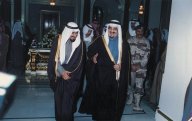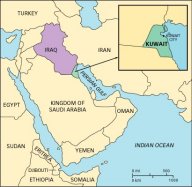


Despite the outcome of the conflict with Iran, Saddam Hussein declared himself the victor and, flushed with the success of his victory, he decided to embark on his next military adventure. He was also determined that, if the States of the Arabian Peninsula had supported and helped to finance his regime during his conflict with Iran, then they should be prepared to continue their subventions after it had ended. After all, as a result of the war which he himself had initiated and which he had prolonged as long as possible, the Iraqi economy was severely debilitated and his exchequer sorely depleted. Saddam needed money to rebuild the economy.
In the course of the first few months of 1990, Saddam Hussein became increasingly aggressive in his relations with Kuwait. Both Kuwait and the United Arab Emirates were persistently exceeding their OPEC quotas. In May, at the Arab League Summit in Baghdad, Saddam Hussein strongly criticized unnamed States for exceeding their OPEC oil production quotas, thus depressing the oil price which Iraq in particular wished to see rise. He then accused Kuwait of stealing oil worth $2.4 billion from an Iraqi oil field. By July, Kuwait was being told that it must not only cancel all war debts but also “refund” the $2.4 billion of the “stolen” oil and compensate Iraq for the loss of oil revenue resulting from the low oil price caused by Kuwait’s over-production. Although an attempt was made to resolve the dispute on 31st July 1990, when a meeting took place between Kuwaiti and Iraqi negotiators in Jeddah, it was clear from the nature of Iraq’s demands that agreement was impossible. Nevertheless, since Saddam Hussein had given his word to King Fahd, President Mubarak and the late King Hussein of Jordan that he would not invade Kuwait, the invasion when it came, came as a shock.


